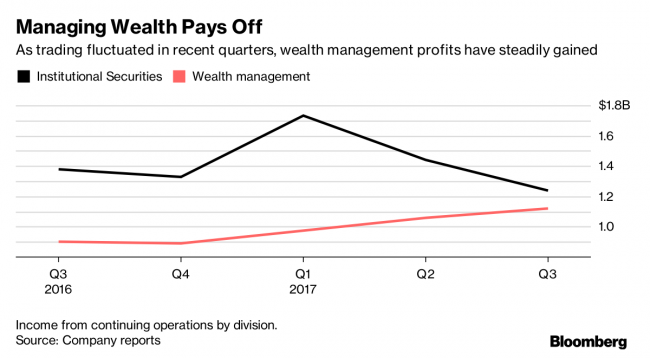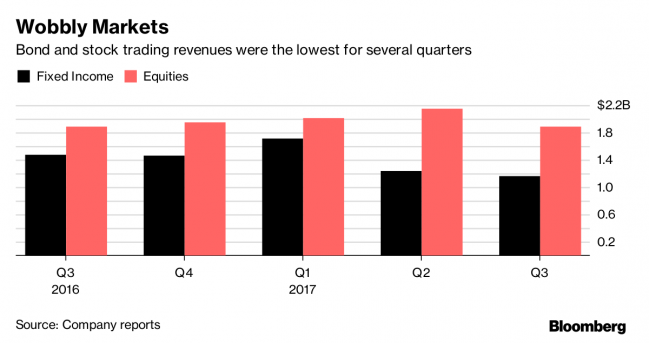(Bloomberg) -- This is why James Gorman wanted Smith Barney.
While Morgan Stanley (NYSE:MS) suffered the same bond-trading slump that afflicted rivals, the firm’s wealth management business carried it to improved profit last quarter. That division -- which Gorman made a central part of the bank’s future as a driving force behind the crisis-era acquisition of Citigroup Inc (NYSE:C).’s Smith Barney brokerage -- posted its third straight quarter of record pretax earnings.
The business of managing money always promised to insulate Morgan Stanley from swings in trading revenue tied to the whims of hedge-fund clients. That promise has been realized over the last six months, when volatility hit new lows and stock markets set record highs. As a result of Chief Executive Officer Gorman’s strategic moves, the firm earns the biggest share of revenue from wealth management of the six biggest U.S. lenders.
“Our third quarter results reflected the stability our wealth management, investment banking and investment management businesses bring when our sales and trading business faces a subdued environment,” Gorman said in a statement on Tuesday.
Return on equity, a gauge of profitability, rose to 9.6 percent from 8.7 percent a year earlier. Gorman has targeted 9 percent to 11 percent for 2017.
Shares rose 1.4 percent to $49.60 at 8:10 in early trading in New York.
Bond-trading revenue fell 21 percent to $1.17 billion, compared with the $1.15 billion estimate of analysts surveyed by Bloomberg. Equities trading was little changed at $1.89 billion, compared to the $1.86 billion estimate.
The quarter’s subdued trading environment included low volatility in rates and currency trading, tight spreads in credit and a lack of “idiosyncratic” events, Chief Financial Officer Jonathan Pruzan said Tuesday in an interview.
“People are waiting for tax reform, people are waiting for inflation, changes in the regulatory landscape,” Pruzan said. “So there are catalysts out there, but whether or not they’re realized this quarter or not, there’s a lot of speculation.”
Wealth-management revenue advanced 9 percent to $4.22 billion, compared with the $4.1 billion prediction of KBW Inc. Pretax profit from that business rose 24 percent to $1.12 billion.
Another area of strength in the quarter was investment banking: Revenues there rose 15 percent to $1.27 billion, exceeding the $1.15 billion estimate of analysts surveyed by Bloomberg. Mergers activity maintained its momentum and the “pipelines remain healthy across products and geographies,” Pruzan said, adding that he is optimistic about that business if markets remain stable.
Morgan Stanley’s net income rose 12 percent to $1.8 billion, or 93 cents a share, from $1.6 billion, or 81 cents, a year earlier. That compares with the 82-cent average estimate of 19 analysts surveyed by Bloomberg.
Several firms reported earnings that exceeded analysts’ estimates despite the drag from lower bond-trading revenue. JPMorgan Chase & Co (NYSE:JPM)., the biggest U.S. bank, said profit rose 7.1 percent, while Bank of America Corp (NYSE:BAC). and Citigroup Inc. posted increases of 13 percent and 8 percent respectively.
(Updates with CFO comments in the eighth paragraph.)



